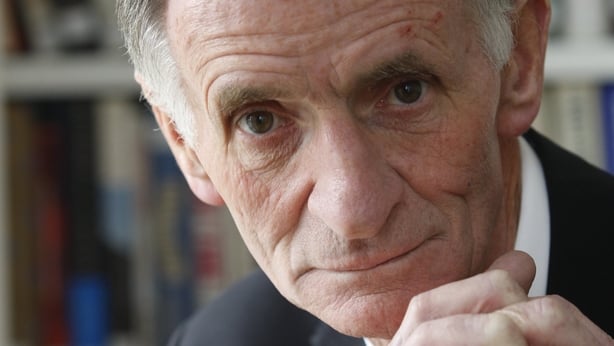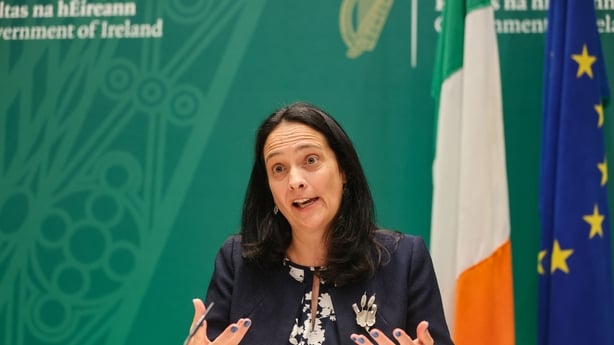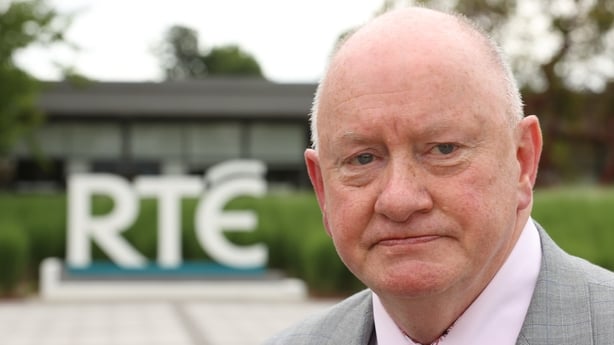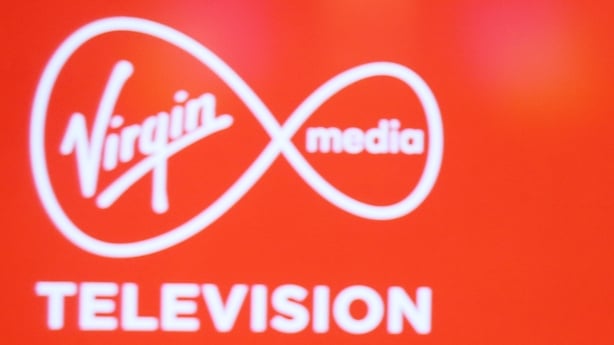"Over the last ten years, we have pointed to RTÉ's growing over-reliance on commercial revenue. Consistently, we have made the case for a core level of index-linked public funding to enable us to guarantee the Irish people the range and quality of broadcasting services they are entitled to expect."
At first glance, you’d be forgiven for thinking this might have been a statement uttered in the last few weeks or months by a member of RTÉ’s senior management or board, or a politician.
But in fact, these were the words of the late Paddy Wright, writing in his capacity as chairman of the RTÉ Authority in the 2001 annual report.
Fast forward a decade and in the 2011 annual report, then chairman Tom Savage wrote of RTÉ’s funding position, "cost control by itself is no longer enough and the scale of the problem calls for a fresh vision of how a national public service media organisation should serve Ireland in the coming years".

While writing of the outlook and need to adapt and innovate in the 2022 annual report, then RTÉ Board chair, Siún Ní Raghallaigh, said: "It is almost impossible to fully consider the possibilities without a proper resolution to the issue of funding public service media in Ireland, something I am committed to in my role as Chair."
Because, for many decades, successive leaders of the national broadcaster have bemoaned the station’s broken funding model.
The situation has become ever more acute over the last ten years or so, with the rise of social media and the internet, which has eaten much of the commercial advertising lunch of "traditional" media, RTÉ included.
Back in 2007, at the height of the Celtic Tiger, RTÉ took in €246m in commercial revenue.
In 2022, the most recent year for which accounts have been published, that figure was €152m - a decrease of 38%.
And yet, despite this dramatic shrinking of income from the commercial side of the business, there has been no compensatory increase in public funding for RTÉ in the interim.
The television licence fee has remained frozen at €160 a year since 2008, despite legislation being there to allow it to be index linked by ministerial order.
In 2007, RTÉ’s income from the fee was around €196m and that figure rose to around €200m over the following few years.

Yet fifteen years later in 2022, despite an 18% increase in the population of the country in the intervening years and increases in the cost of living, licence fee income remained broadly the same, at €195m (before falling to €178m last year following the payments controversy at the broadcaster).
Indeed, the number of TV licences purchases each year has been in steady decline over recent years, falling from 1,038,986 in 2018, to 961,277 in 2020 and then just 824,278 last year.
Even though its income has fallen, RTÉ’s mandate has remained broadly the same over the decades and it is still expected to fulfil its core obligations around public service content, despite seismic changes in that time in the manner in which that content is produced, delivered and consumed.
But in recent years, it has become increasingly apparent that if the funding trajectory were to remain the same, that task would grow ever more difficult to fulfil.
Successive Governments have failed to grasp the nettle when it comes to addressing the issue, cognisant that imposing an extra funding burden either directly on the public, or indirectly on it via the exchequer, would be a hard and controversial sell to the electorate.
The crisis that unfolded rapidly at the station in June of last year, didn’t help RTÉ’s cause, shattering audience trust.
But it also led to a fall off in licence fee income and a bailout, pushing the current Government into a situation where it had to commit to finally tackle the funding challenge.
Last week, true to its word, ahead of the Dáil summer recess, the Cabinet agreed a new hybrid funding model that will provide some certainty for RTÉ over the next three years.
It will see RTÉ receive a guaranteed €225m in funding from both the licence fee and the exchequer next year, rising to €240m in 2026 and €260m in 2027.

That means the exchequer may have to stump up around €50m in funding for RTÉ next year alone and without a significant recovery in licence fee income that will rise further in the following two years.
In return, RTÉ will be expected to push through its reform agenda in the form of its recently published five years strategic plan, including reducing headcount by 400, moving production of certain flagship programmes offsite, embracing new technology and overhauling corporate governance and transparency.
It will also fall under the remit of the Comptroller and Auditor General and continue to be scrutinised by NewEra and Comisiún na Meán.
"What has been agreed today provides financial stability for RTÉ for future years, coupled with reformed fee collection methods," said media minister, Catherine Martin on Wednesday.
"This is unprecedented."
"Guaranteeing that funding, that future, is an accomplishment that will serve viewers, listeners and audiences - that will serve all of our society."
The TV licence, though, will continue in its current outdated form, based on the existence of a TV in a property.
The Government plan does include additional funding of €6m for An Post to improve how it collects the fee and ensure compliance.
A TV licence Technical Working Group will also be reconvened to consider how to make the collection system more effective.

With an evasion rate of about a fifth, there is plenty of work to be done on that front.
An Post’s database of properties needs to be enhanced, as currently around 20% of the addresses are anonymous.
Were that resolved, fixed penalty notices could then be used as a better alternative to court summons, to prevent the legal system being flooded with TV licence cases as enforcement is beefed up.
While statutory declarations for premises without a TV could also perhaps be made mandatory, it has been suggested by Catherine Martin, and these would be the focus of inspections.
The funding boost is still some €55m less than what RTÉ had said it needed over the next three years.
But there’s no doubt the multi-annual commitment has provided the organisation with the short to medium-term certainty it needs to get on with its much needed programme of reform and rebuilding shattered public trust.
The increases will also enable it to do new things, while also doing existing things better.
"The Board of RTÉ is satisfied that the funding suggested will enable RTÉ to continue the critically important process of organisational change and reform already well under way in RTÉ," current chair of the organisation’s board, Terence O’Rourke said in response to the news.
"In particular, I welcome the commitment on the part of Government to a multi-annual funding model. This will help provide an ongoing and suitably stable environment in which the organisation can make the medium and long-term strategic decisions that are integral to its future."
'Kicking the can down the road'
But the plan has also been met with significant criticism from a number of angles, amid accusations that the Government "bottled it" and has only "kicked the can down the road".
It is clear that the plan is very much a compromise and politically driven.
There was a big opportunity there to take on board the recommendations of the Future of Media Commission and the Oireachtas Joint Committee in 2017.
There was also a chance to emulate one or more of the different models already in use across Europe to fund public service media, like the media tax in Finland or the household charge used by Switzerland and Germany.
But there were differing opinions within the coalition about the best model to choose - with Catherine Martin favouring a fully exchequer funded option, but the Minister for Public Expenditure, Paschal Donohoe, as well as senior Fianna Fáil figures, arguing for retention of the licence fee, so that other Government spending would not have to be compromised.
The prospect of a universal charge on all households, regardless of whether they have a TV or not and which perhaps could have been collected by Revenue, was also resisted, because of concerns it could have created a political flashpoint ahead of the general election.
So, what we got instead was a political fudge - a hybrid model that stabilises and secures RTÉ’s finances for at least three years and leaves the next or subsequent Governments with the problem of what to do then.
But this decision to retain the current licence fee system was viewed as a "grave disappointment" by the National Union of Journalists (NUJ).
"It is an outmoded system which has not been properly resourced," said Séamus Dooley, NUJ Irish Secretary.
"Its replacement was advocated by the Future of Media Commission, by the joint Oireachtas committee and even by the Minister herself. Today’s announcement means that an anachronistic is to be retained rather than a modern, funding system."

"There is a supreme irony in the fact that having ignored a series of expert reports the government is to establish an expert, technical group to review the funding model."
Even within Government circles, there is a private acceptance that the outcome, while pragmatic, will far from resolve the RTÉ funding question into the long-term future.
What happens as the number of homes with a traditional TV inevitably falls further, for example? Should support for paying the TV licence not improve, what then?
Were the plans to tackle the evasion rate not to work, will there be an appetite for ongoing exchequer subvention? What happens if future Governments adopt a more hostile attitude to funding RTÉ than the current one?
If the economy takes a nosedive and hard decisions need to be made, will RTÉ funding be seen as a low resistance target for spending cuts?
"The writing is on the wall for the TV licence," said Louise O’Reilly from Sinn Féin, which had backed a direct exchequer funding model.
"It is long past time it was scrapped. Today’s decision is indicative of a Government with no backbone. Instead of reform and change, they cling to the status quo."
The independent media sector is also unhappy with the plan, but for different reasons.
The Government did announce as part of the package that it would increase funding to the Broadcasting and Media Funds next year, which serves wider public service media.

But Virgin Media Ireland criticised what it said was the Government’s failure to "financially recognise and support" its public service broadcasting remit.
"Not only does today's announcement disregard our 25-year record of delivering extensive Public Service content and the 93% of the population that we reach on an annual basis, it also further distorts the market," said Áine Ní Chaoindealbháin, Managing Director of Virgin Media Television.
"RTÉ will now be in a more dominant position than ever before where it will receive a guaranteed €725m from the taxpayer over the next three years while continuing to benefit from the largest share of commercial revenue."
"In short, it is a reward for inefficiency and all-round bad practice. In view of the decision Virgin Media Television has no alternative but to review all options including our position with regards to our existing Public Service Broadcasting commitments."
While the Independent Broadcasters of Ireland (IBI) pointed out that they face the same requirements of balance, fairness and impartiality as RTÉ and must provide 20% of their output as news and current affairs, yet the market doesn’t support that.
IBI chairman, John Purcell, said just as RTÉ has had an "existential crisis" over the last 12 months, local, regional and national independent radio is in "something of a crisis in relation to continuing to provide our news services, so we believe due regard needs to be given to that".
And so, after a tumultuous 13 months for the national broadcaster, finally RTÉ appears to be turning a corner.
Scandals all unearthed, investigations all complete, reform plans all drawn up and under way and funding all secured (for now), it and the audiences that it is there to serve, can look forward to a better future.
But the long-term funding question hasn’t gone away.
And one wonders whether, in 10 years’ time or even less, RTÉ Board chairs will once again be writing about the challenges of financing the organisation in its annual reports.







